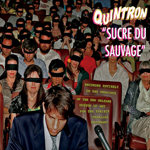|
|
 |
Dusted Reviews
Artist: Quintron Album: Sucre Du Sauvage Label: Goner Review date: Apr. 13, 2011 |

|
|
|
 |
The general consensus regarding New Orleans-based mad scientist Mr. Quintron is that his particular brand of greasy electronic bounce (“swamp tech” as he calls it) is best experienced live. With a keyboard rack tricked out to look like the grill of a ‘70s Lincoln, the Drum Buddy thumping, and partner-in-crime Miss Pussycat offering up sweetly twisted puppet shows to complement the racket, it’s not a hard point to make. Quintron’s aesthetic as a whole is like performance art that you can get real low to, but you sorta need to see it to revere it.
His most recent album, Sucre Du Sauvage is in many ways the exception that proves the rule (or at least complicates it). This is Quintron’s best summation yet of his iconoclastic melding of raw rock & roll, R&B and funk, experimental electronics and art. Appropriately enough, the album was recorded live with no overdubs at the New Orleans Museum of Art as part of a three-month exhibit devoted to the world of Quintron and Miss Pussycat. Released as a CD and a double-LP, Sucre Du Sauvage is divided into two sections: the first a set of songs (perhaps the most traditionally well-crafted of his career thus far), the second a collection of field recordings made on the grounds of NOMA and augmented with instrumental touches.
The album kicks off with the hard-charging call-to-arms “Ring the Alarm” and reinforces Quintron and Miss Pussycat as outsider soldiers. The song chugs along as an ecstatic whirl of analog squiggles, thick organ tones, bells, whistles and phat beats; it delivers the rush of a live show despite its rather austere setting. While the energy level isn’t always at the same fever pitch as “Ring the Alarm,” the first section of Sucre Du Sauvage is all about defiance, individuality and the celebration of both. “Kicked out of Zolar X” raises a glass to all those booted from a band (“So what? / so what? / so what? / so what?!” ).While “New Years Night,” with its refrain of “boogie little children / boogie all night” is an unholy party jam that marries Tony Joe White and Suicide. Miss Pussycat’s turns at center stage tend to be slightly less rollicking yet equally idiosyncratic, sounding like transmissions beamed in from a Technicolor planet of sock monkeys and magic shampoo.
Part two of Sucre Du Sauvage is much subtler, more experimentally minded, and a bit jarring, but it brings up another interesting aspect of Quintron: his status as a fixture of New Orleans. The Crescent City may have captured the imagination of the world, but it’s doubtful that anywhere in those daydreams is there a guy quite like Quintron. There are no obvious nods to the very rich, yet overly familiar markers of New Orleans culture here. No allusions to Satchmo or Decatur Street. In fact, Quintron goes so far as to declare on “Ring the Alarm” that “We don’t do jazz festival.” Still, this is an album made not only in New Orleans (and in a cultural bastion no less), but made by New Orleans. The sounds of the city literally seep into the final six tracks on the album and gently conjure the ambience of a living breathing town.
Sucre Du Sauvage is an album of contradictions: a studio album recorded in front of a live audience in a fine arts museum; an album more song-oriented than almost all previous Quintron efforts but that closes with a series of ambient found-sound pieces; an album that plants a flag firmly in the dirt and grime of New Orleans with nary a reference to its rich and beloved past. Whether New Orleans asked for it or not, Sucre Du Sauvage is a declaration of independence by Quintron and Miss Pussycat on behalf of the town that nurtures and celebrates them.
By Nate Knaebel
|







